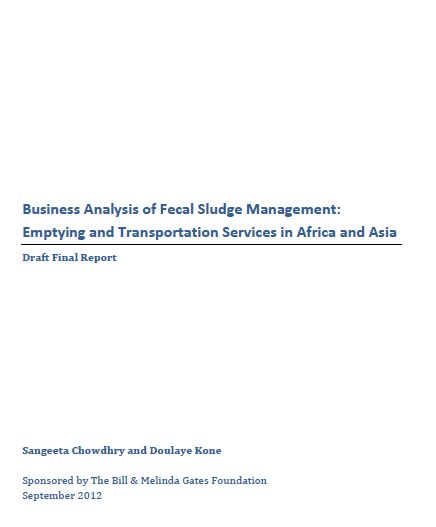Business Analysis of Fecal Sludge Management: Emptying and Transportation Services in Africa and Asia - Draft final report
Chowdhry, S., Koné, D. (2012)

Published in: 2012
Publisher:
Bill & Melinda Gates Foundation, Seattle, USA
Author:
Chowdhry, S., Koné, D.
Uploaded by:
SuSanA secretariat
Partner profile:
common upload
19574 Views
1138 Downloads
Content - Summary
This study was initiated and funded by the Bill & Melinda Gates Foundation to map the urban sanitation situation and assess business and operating models for fecal sludge management in 30 cities across 10 countries in Africa and Asia, specifically focussing on the extraction and transportation market segments. The available information about fecal sludge emptying and transportation service delivery is both limited and weak. In a majority of cities, fecal sludge management (FSM), as a service to households, is largely ignored by local and national governments. Decision makers, entrepreneurs and investors in social businesses lack the necessary information – on market size, business opportunities, and profitability – to make FSM a functional component of the sanitation value chain. In many cases the entrepreneurs also lack recognition from the public utilities that they are providing these services to households that are not connected to the centralized sewers – which is the case for the majority of households in the surveyed cities.
The study was carried out in Burkina Faso, Ethiopia, Kenya, Nigeria and Senegal in Africa and Bangladesh, Cambodia, India, Malaysia and Vietnam in South/Southeast Asia. Three cities of varying population sizes in each country (under 100,000 to over 5 million) were selected to provide a view of a range of urban fecal sludge emptying and transportation situations and services. The study was conducted by a team of local consultants in each country and managed by a global coordinator. The approach used was to gather users’ perspectives through household surveys and to collect data on the financial and business models of the emptying service providers. For consistency of execution and data gathering by all ten-country teams, a common analytical framework was created outlining the survey questions for the households and business owners.
The study generated vast amounts of data from over 13,000 household surveys and 150 detailed financial surveys of fecal sludge emptying and transportation service providers. This report presents the comparative analysis based on these data from those surveys in the 30 cities. Details of each country study are also available in the final reports submitted by the country teams. Findings in this report refer only to the cities surveyed in the 10 countries and not to African or Asian countries in general and the analysis based on the information and data from the ten country reports.
Some regional trends were seen in the business operations between Africa and Asia:
- Average truck capacity in Asia is just over 3m3 and in Africa around 10m3 – tracking the differing average pit volumes;
- Pits in Asia average 2m3 vs. 7m3 in Africa;
- Age of emptying trucks in Africa is 15 to over 30 years and in Asia between 5 to 10 years;
- Local assembly of trucks in done in Asia, while businesses in Africa import second hand trucks; and
- The cost of the trucks is three times higher in Africa than in Asia.
To capture the full potential of the very large $134million market, this report presents several recommendations for consideration, including ways to support the scaling of the single truck operators to become mid to large sized operations. Access to finance is an area that will need to be addressed, as self-financing is very limiting and a very slow road to business growth. To save on fuel costs and increase truck efficiency, transfer stations must be introduced – either as permanent structures or in the form of innovative ideas such as the geo-tubes being tested in Malaysia. Furthermore, the experience in Malaysia has shown that regulating scheduled desludging is needed to enforce the correct operations of the septic tanks and maintaining predictable and steady income for the operators. Truck sourcing options need to be considered – especially local manufacturing or assembly – without which the capital outlay on poor quality vehicles in Africa would continue to adversely impact return on investment. A more effective supply chain is also needed with an inventory of spare parts to reduce the downtime of these expensive trucks.
Lastly, evaluating the financial viability of the businesses and affordability of their services to households addresses one piece of the ecosystem needed to create financially and environmentally sustainable business models. Without a safe place to dump the collected sludge, merely collecting and transporting it away from the households is effectively only relocating the sludge. Sludge treatment plants and sludge reuse are needed to complete this cycle to ensure a complete and effective sanitation value chain.
++++++++++++
Note: the individual country reports from the 10 countries are also available in this library.
Bibliographic information
Chowdhry, S., Koné, D. (2012). Business Analysis of Fecal Sludge Management: Emptying and Transportation Services in Africa and Asia - Draft final report. Bill & Melinda Gates Foundation, Seattle, USA
Filter tags
East Asia & Pacific English Faecal sludge treatment processes Fundamental research and engineering Sub-Saharan Africa Urban (entire city)














